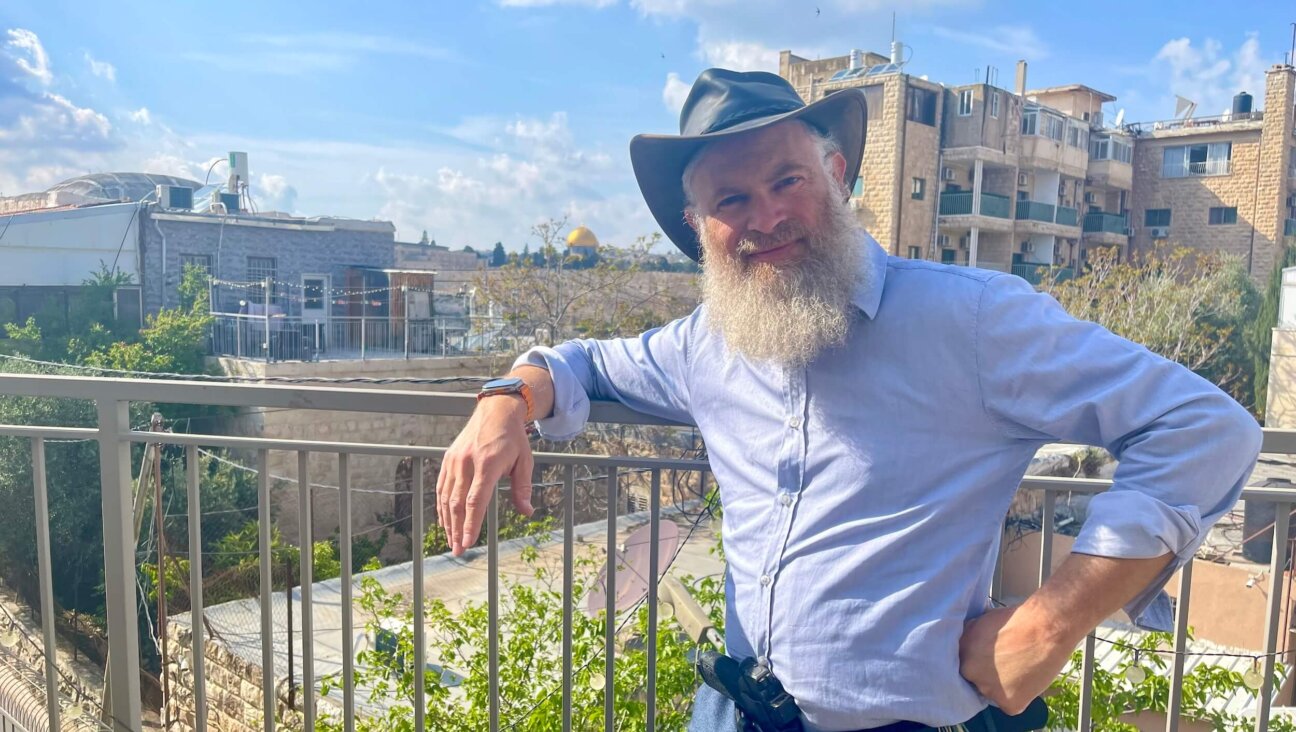Activists Scale Back Opposition to ‘Map’
WASHINGTON — As the Bush administration steps up its drive to implement the president’s “road map” to Middle East peace, pro-Israel lobbyists and their allies in Congress are dropping their initial antagonism and moving toward active support of the administration’s stance.
Last week the House international relations committee unanimously approved an amendment to next year’s State Department authorization bill, promising direct American financial aid to a reformed, peaceful Palestinian state once it is established. The amendment, which was supported by both the American Israel Public Affairs Committee and Americans for Peace Now, endorses President Bush’s two-state approach to resolving the Israeli-Palestinian conflict and declares that “a stable and peaceful Palestinian state is necessary to achieve the security that Israel longs for.”
Declaring that “the United States has an interest in a Middle East in which two states — Israel and Palestine — will live side by side in peace and security,” the bill calls on Israel to “take concrete steps in support of the emergence of a viable, credible Palestinian state.” It was introduced by Democrats Tom Lantos of California and Gary Ackerman of New York and Republican Henry Hyde of Illinois.
Congressional staffers described the bill, expected to “easily sail through” both houses of Congress, as an attempt to “codify” Bush’s Middle East speech of June 24, 2002, which set out conditions for creation of a Palestinian state. The bill’s conditions, however, are more explicit than those in the speech. It says Washington should recognize the Palestinian state only after a new Palestinian leadership is elected, after the Palestinians cease terrorism and incitement, take counter-terrorism measures in full cooperation with Israel, and ensure democracy and rule of law.
The enactment of the strict conditions appears to be a victory for Israel, which views the president’s speech as tougher on the Palestinians than the road map.
Nevertheless, congressional aides note, the bill also spells out the “light at the end of the tunnel” for the Palestinians in the form of statehood more explicitly than before. And while it does not specify aid levels, it says its purpose is to “demonstrate U.S. willingness to provide substantial economic and humanitarian assistance and to support large-scale multilateral assistance” to a reformed, peaceful Palestinian state.
In another indication of solidifying congressional support for administration peacemaking, a letter to President Bush is circulating in the House, signed by 21 members so far, supporting the president’s personal commitment to the road map and urging Israeli steps to match the Palestinians’. “Along with changes on the Palestinian side,” the letter says, “we share your belief that the road map must also be implemented by Israel, with the end goal, as you have stated many times, ‘two states living side-by-side’ in peace and security.”
The letter to the president, initiated by California Democrat Lois Capps, is accompanied by a “Dear Colleague” letter, asking House members to sign on, which highlights endorsements of the road map by top Jewish community leaders. Those cited include Aipac president Amy Friedkin and executive director Howard Kohr, American Jewish Committee executive director David Harris and the longtime president of the World Jewish Congress, Edgar Bronfman Sr.
The congressional initiatives underscore a scaling back by Jewish organizations of resistance to the road map since its publication two weeks ago. Aipac issued an unqualified endorsement of the plan shortly after publication. Other Jewish organizations seem to have followed suit. One reason, said a prominent lobbyist for Israel, is the belief among pro-Israel activists that with Prime Minister Sharon publicly seen as accepting the plan, they would be ill-advised to appear more hawkish than the Likud leader.
A more substantial reason is the calculation that the president seems determined to advance the road map, and confronting him now on his Middle East policy could have “disastrous consequences,” in the words of one activist here.
Increasing the pressure on Jewish organizations to avoid appearing obstructionist is the recent flurry of statements by journalists and politicians depicting them in precisely that light. Such statements have been a staple in the European media for months. In recent weeks they have surfaced in mainstream American circles as well, with the Bush administration’s top Middle East policy aide and the nation’s best-known foreign policy journalist weighing in.
The administration aide, William Burns, assistant secretary of state for Near Eastern affairs, gave what eyewitnesses called a tacit endorsement to the obstructionist image during a May 4 meeting in Jerusalem with members of the Israeli-Palestinian Peace Coalition. Responding to a question about the administration’s determination to advance the road map in the face of opposition from the Christian right and the organized Jewish community, Burns replied that the president’s determination is strong enough to override such opposition, according to Knesset member Colette Avital, a Laborite who was present.
New York Times columnist Thomas Friedman wrote in last Sunday’s newspaper that the “Christian right and the Likud-run Conference of Presidents of Major American Jewish Organizations” were blocking Bush’s path by supporting “the lunatic Israeli settler movement.”
Reacting to Friedman’s column, the executive vice chairman of the Presidents Conference, Malcolm Hoenlein, told the Forward that his organization has “supported the president’s positions” as laid out in his June 2002, speech, “and the efforts to pursue these principles.”
Hoenlein called Friedman’s characterization of his organization “dumb,” “silly” and “bearing no relevance to reality.” The Presidents Conference supports whichever party is the ruling party in Israel at any given moment, he said, “but we are not a rubber stamp, and we are not run by anybody.”

I hope you appreciated this article. Before you go, I’d like to ask you to please support the Forward’s award-winning journalism this Passover.
In this age of misinformation, our work is needed like never before. We report on the news that matters most to American Jews, driven by truth, not ideology.
At a time when newsrooms are closing or cutting back, the Forward has removed its paywall. That means for the first time in our 126-year history, Forward journalism is free to everyone, everywhere. With an ongoing war, rising antisemitism, and a flood of disinformation that may affect the upcoming election, we believe that free and open access to Jewish journalism is imperative.
Readers like you make it all possible. Right now, we’re in the middle of our Passover Pledge Drive and we need 500 people to step up and make a gift to sustain our trustworthy, independent journalism.
Make a gift of any size and become a Forward member today. You’ll support our mission to tell the American Jewish story fully and fairly.
— Rachel Fishman Feddersen, Publisher and CEO
Join our mission to tell the Jewish story fully and fairly.
Our Goal: 500 gifts during our Passover Pledge Drive!
























